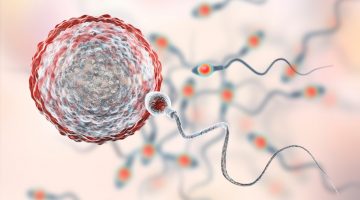PCOS & Infertility – How it Causes Infertility and Treatment Options

Fast Facts About PCOS and Infertility
- Polycystic Ovary Syndrome (PCOS) is one of the most common hormonal endocrine disorders in women. Approximately 5-10% of young women have it, and yet we don’t really know why. In general, PCOS means that women with it grow bigger ovaries with many small cysts. These cysts are generally not dangerous but often lead to severe hormone imbalances which can cause infertility.
- PCOS is the number one cause of infertility accounting for approximately 20-25% of all cases infertility.
- It is estimated that 50% of those with PCOS remain undiagnosed. Many women unknowingly struggle with PCOS for years, and only when they have difficulty getting pregnant and seek the help of a fertility specialist do they learn that PCOS is causing their infertility.
- There are several fertility supplements specifically designed to improve the fertility of PCOS patients. Click here to check out the ten best PCOS supplements!
Does PCOS Cause Infertility?
Yes, simply put, PCOS causes infertility. In fact, it is the number one cause of female infertility accounting for roughly 20-25% of all cases of infertility. Fortunately, as we will learn below, there are many fertility treatments that treat PCOS caused infertility making it possible for most to get pregnant with PCOS if treated before age becomes a significant factor. In fact, due to the mechanism in which it causes infertility, it is actually one of the easier forms of infertility to treat.
How does PCOS Cause Infertility
During a normal cycle, a woman develops many follicles that contain eggs. Around day 14 of her cycle when one of the eggs is appropriately developed, a woman ovulates, or releases the egg.
Women with PCOS often develop many small, antral follicles with eggs in them, however, the eggs fail to mature properly so they are never ovulated. Most women with PCOS do not ovulate or don’t ovulate regularly. This is known as anovulation, and it makes it difficult to get pregnant without fertility treatment.
PCOS Fertility Treatment
As mentioned, PCOS is the leading cause of infertility. The good news is there is lots you can do to improve your fertility and many fertility treatment options. Before we go there, let’s briefly touch on the medications someone with PCOS encounters when trying to conceive.
Common medications used to treat PCOS:
- Letrozole (Femara): Originally developed as a breast cancer medication, letrozole is the most often the best choice to stimulate the ovaries during an ovulation induction timed intercourse cycle and IUI cycles. For those with PCOS, it works by increasing the amount of FSH the pituitary gland secretes.
- Clomiphene (Clomid): An anti-estrogen medication that is often used for timed intercourse and IUI cycles though it is rarely used at CNY Fertility as a female fertility medication. If you’re OBGYN or fertility specialist is prescribing Clomid, you may want to ask about Letrozole.
- Metformin (Glucophage, Fortamet, others): An oral medication for type two diabetes helps improve insulin resistance and lower insulin levels. Though it may not seem related to infertility, metformin has been shown to help tremendously for those with PCOS.
- Gonadotropins: Injectable medications usually encountered after failed IUIs. It can be used with both IUI and IVF cycles.
- Fertility supplements can help to improve PCOS symptoms like insulin resistance, irregular ovulation, anovulation, and embryo quality.
Common fertility treatments for those with PCOS:
Ovulation Induction with Timed Intercourse
ovulation induction is usually the first medical intervention someone that is trying to get pregnant with PCOS encounters. Ovulation induction involves taking medications (like letrozole and sometimes a trigger shot) to help stimulate ovulation. Couples are then instructed to engage in timed intercourse.
Intrauterine Insemination (IUI)
Also known as artificial insemination, IUIs typically use similar medications to ovulation induction (but can also use gonadotropins) and have the advantage of inserting the sperm inside the uterus making the journey the sperm must travel much shorter.
In Vitro Fertilization (IVF):
IVF is the gold standard of fertility medicine offering the quickest time to pregnancy per treatment cycle for anyone (including those with PCOS). The eggs are removed from the woman’s ovaries, fertilized, grown in a lab, and 3-5 days later transferred back into the woman’s uterus or frozen for a subsequent Frozen Embryo Transfer. There are many different medication protocols that go along with IVF.
Donor Egg/Sperm
Most people with PCOS do not turn to Donor Eggs or Donor Sperm until they have either failed multiple IVF cycles, are of advanced maternal age or have a semen analysis showing azoospermia.
While CNY Fertility Specialises in assisting reproduction, women with PCOS also have many other symptoms that are often managed by their OBGYN or other medical professionals.
The Bottom Line
PCOS is the number one cause of infertility due to the number of people that PCOS effects and the fact that PCOS often disrupts normal hormonal balances critical to ovulation. The great thing is that there is help for you and others trying to get pregnant with PCOS. Our team of fertility specialists routinely consult with those suffering from PCOS caused infertility from around the country and around the globe. While we primarily use ovulation induction and IUI for those that live near our offices, those turning to IVF travel from around the country to our offices due to our high-quality affordable care that is one third the cost of the national average.
Schedule your consultation today!




